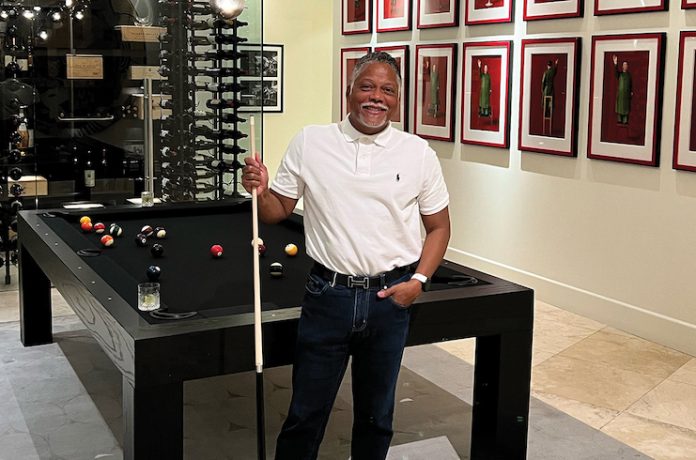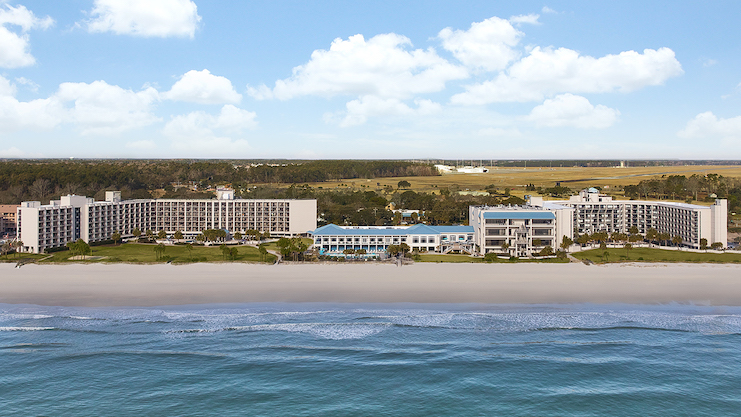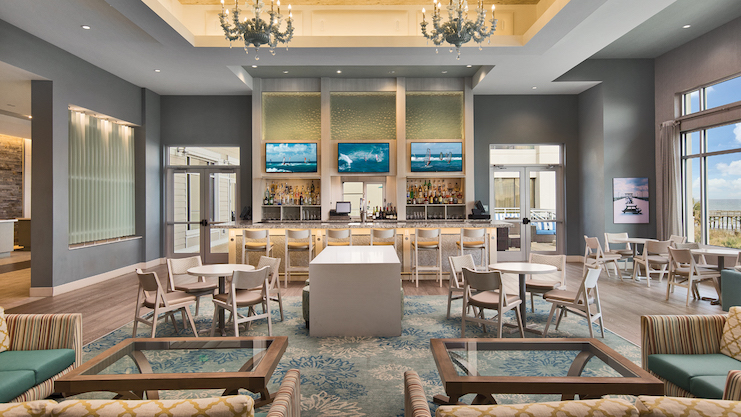
When Kenneth Fearn entered the lodging industry a couple of decades ago, many of the diversity and inclusion programs that now exist were just getting their start and consequently were of little help.
Nevertheless, armed with a strong financial background and an intense desire to get out on his own, Fearn firmly established Integrated Capital, which gave him the ability to “call his own shot.”
Integrated Capital—a Santa Monica, California-based private equity investment firm with a focus on hospitality—has invested over $500 million in hotel assets since its founding in 2004, including properties such as the DoubleTree Resort Myrtle Beach and the Residence Inn National Harbor. But while Fearn did have his share of guidance on how to succeed (see Executive Expertise sidebar on p. 37) from those who went before him, he maintained it wasn’t necessarily about his background at that time.
“To be honest, there weren’t a whole lot of mentors that were focused on pushing you from the minority angle way back when,” he said, later adding, “The more things change, the more they stay the same.”
Nevertheless, Fearn did acknowledge that much has changed in the industry from a diversity perspective since then, while emphasizing there is still plenty of work to be done. “I think progress has been made; it’s been slow, but I think there are areas where real change has happened. For example, the amount of women participants at the executive level is absolutely fantastic; that change has been real. You now see more people of color in executive positions within hotels. That is absolutely real, and it’s something that I’m actually quite proud to see. I think that in some small way we were able to have some impact there as well,” he said.
But despite that progress, Fearn pointed out that the real issue for the industry remains hotel ownership by underrepresented groups.
“I think where not much has changed is around minority ownership in hospitality, and that’s where there’s a lot of room for improvement. I wish I had the magic wand and had the answer as to what we need to do, but the challenges remain the same. It’s always about access to capital. The facts are the facts: women and minorities just have a more difficult time because they don’t have access to capital,” he said.
Fearn continued directing some of the responsibility onto the large brand companies.
“So, the question just becomes how can the industry—meaning the franchisors and brands—help facilitate that? It’s great to have these diversity seminars and talk about the industry and ‘Hotels 101’ and so forth, but the real thing that needs to happen is how can they be of use with the balance sheet? How can they help provide opportunities to people of color to help them get ownership in this business and not just a one-off, but how do you do the next one? It’s not good enough just to get a minority into ownership and then throw them to the franchise organization and hope that they survive. It needs to be supported so that they can be successful,” he said.
Getting His Start
Fearn’s path to success within hospitality is rooted back in the early ’90s when he joined McKinsey & Company, a Los Angeles, California-based strategic management consulting firm. According to Fearn, a colleague had taken on a hospitality project for one of the major brands, prompting him to comment, “Wow, that’s kind of interesting.” After all, as he put it, “Who doesn’t like to stay at a cool hotel?”
From there, Fearn was convinced by Lew Wolff, founder and principal of Maritz, Wolff & Co., that “he’d been a consultant long enough and needed a real job.” In fact, the private equity investment firm had just created an acquisition fund for luxury hotels.
“It was an incredible learning experience with a great company and a great business plan. I learned a lot and had some amazing experiences,” said Fearn. After some eight years with the company, Fearn opted to leave his position as managing director and CFO to go out on his own, but it was not an easy decision. “Leaving Maritz, Wolff was not easy, and it was not for the faint of heart,” he said.
Fearn had plenty going for him, including a strong financial background that included an earlier stint with JP Morgan & Company working with corporate mergers and acquisitions. He further added that he was “fortunate” that Hilton Hotels Corporation was in his backyard in Southern California and had begun at least talking about diversity.
Fearn recalled thinking, “Maybe this is my opportunity to try and become the next generation of folks investing in the space and doing it on my own. I took a flyer and left to try and raise the equity to do it.”
According to Fearn, his first transaction was a $50 million deal that included a $30 million non-recourse loan. From there, the company was off and running, but he acknowledged that raising capital has its challenges, pointing out that “the last 10 percent is always the toughest.” Nevertheless, Fearn and his newly formed team at Integrated Capital persisted.
“All of it was a little frightening, but we put our heads down and just pushed from morning, noon, and night. It’s been a very interesting ride,” he said.
An Interesting Ride
Part of that ride, of course, got bumpy in recent years following the pandemic as hotels struggled with occupancy and profitability. In response, Integrated Capital has disposed of several properties and is now asset-light in hospitality. But Fearn was quick to point out that the company remains on the lookout for new opportunities within hospitality.
“We’re looking at a number of transactions in the space both from the perspective of buying existing assets today and new development, but in a unique manner. We’re much more focused on situations where opportunities present themselves that we think we can bring something unique to take advantage of and leverage something, be it entertainment or a particular base of business within a marketplace,” he said.
Fearn also noted that the company is “looking at areas outside of hospitality” and focused on becoming more diversified in large part because of the pandemic. He explained why he is currently bearish on hospitality.
“There’s a perfect storm that’s hit this industry over the past three to four years, and in my humble opinion there’s not a lot of light in sight, which means that it’s time for some very real conversations with everyone together. We need to look at how do we come together to create a profitable business plan for the future for this industry, and it also means educating some of the governmental officials.
“Think about what happened with COVID when there were bailout funds for the airline industry; even the cruise line industry received some bailout funds. The hospitality industry received zero, and that was a crime. So, I’d like to see us come together to really have some robust discussions about what’s needed for this industry to work together toward a brighter future,” he said.
The Future for Diversity
Meanwhile, Fearn remains focused on ensuring a brighter future from a diversity standpoint. He reflected on much of his early experience in the industry and what inspired him to be part of the solution.
“I’d go in these exec team meetings or meetings with brands, and as you’d walk through a [luxury] hotel you’d see maybe a scattering of African-American housekeepers, but you almost never saw an African-American member of the executive team. That’s part of what really drove me into wanting to prove that I could make a difference, and there was an opportunity to really dig into this space,” he noted.
And Fearn has dug in both in hospitality as well as in his local community. He is the co-author of a whitepaper entitled “A Productive Inner City: Rebuilding Los Angeles’ Competitiveness.” The whitepaper examines economic development within the disadvantaged urban area of Los Angeles.
Fearn has also had plenty of impact within the hotel space.
“When we looked at general manager positions within a hotel or any of the executive team positions, we always challenged everyone to go out and find the best resumes, and find the best resumes that included women and people of color. One of the things that came out of that was some amazing executives that were able to fit into our hotels. Over time that grew, and they have gone on to do even bigger and better things, and I do feel a sense of pride around that,” he said.
Executive Expertise: Kenneth Fearn Gives Credit Where It’s Due
If you talk to any successful executive, more often than not they will tell you their careers were shaped, at least in part, by key mentors who helped show them the way. Integrated Capital CEO Kenneth Fearn acknowledged he was no exception, as there were a handful of professionals who helped him along the way.
Fearn comments on the impact of these mentors—some of whom were minorities and some of whom weren’t—below.
Tom Baltimore | Baltimore was president/CEO of RLJ Lodging Trust—which was co-founded by Black entrepreneur Robert Johnson—and now serves in the same role at Park Hotels & Resorts. “As it turns out, I had a number of conversations with Tom at the time. They had already launched [RLJ] and were on their way, and so I had a couple of opportunities to speak with Tom. He was fantastic at walking me through, talking to me about it, and giving advice, so I consider him a good friend. I’ve always appreciated the sage wisdom and advice of Tom Baltimore,” he said.
Stephen Bollenbach | The late Bollenbach was the co-chairman and CEO of Hilton from 1996 to 2007. “He had to bless Hilton selling hotels to me at the time. Steve became a mentor and a friend once I was out on my own, and I bought hotels from them. Every once in a while, I’d ring him up and he’d say, ‘Why don’t you come over on Friday two weeks from now? The afternoon is free, and we can just sit in the office and talk.’ It was a great way to get pearls, and he was willing to do that. He was an icon, and he’s sorely missed for his leadership in the industry today.”
Lew Wolff | Wolff was chairman and co-founder of Maritz, Wolff & Co., privately held real estate investment firm that Fearn joined in 1995. He ascended to the position of managing director and CFO before leaving in 2004 to start Integrated Capital. “Having someone like Lew Wolff be there in the early stages and bring me onto the team and let me run was a great experience. I can’t replace that; that was amazing,” he said.
Ernie Wooden Jr. | Wooden was EVP of global brands at Hilton before leaving the company and the lodging industry to serve as president/CEO of the Los Angeles Tourism & Convention Board. “Ernie became a great mentor and a supporter, and I was highly appreciative of him as I went through my career in the hospitality industry.”













